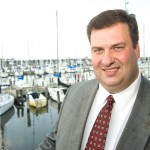You are here
Planning Pays Off for Louisiana Bank Leader
 This story was gathered during David Snyder's visit to New Orleans. David reports on CDC programs in action for the CDC Foundation.
This story was gathered during David Snyder's visit to New Orleans. David reports on CDC programs in action for the CDC Foundation.
David Rubin, assistant vice president of contingency planning for Whitney National Bank, leads the bank’s disaster preparedness and response efforts in New Orleans. A native of Louisiana, Rubin’s job was created after Hurricane Katrina proved how critical it was for businesses to ensure employees’ safety and security while keeping their doors open for business.
“You have to think of employees, as well as their families and everyone who depends on them,” Rubin says. “We actually plan employees’ entire evacuation – including hotels, pet accommodations and everything else they’ll need.”
Rubin joined Whitney Bank in 2007 to help the bank implement a comprehensive security and evacuation plan, and he was on hand for the city’s evacuation during Hurricane Gustav in 2008.
“We were prepared for Hurricane Gustav,” Rubin says. “In fact, we were shocked by the lack of problems we had when we evacuated to Houston for a week. After Katrina, we realized that when things are happening, there needs to be flexibility. You can leave a bank branch and return to it, but if there are no people to run it, that’s a whole different story.”
Having seen firsthand the impact of Katrina, Rubin understands the critical need for coordination across sectors within the community. In June 2010, Rubin hosted and attended a Meta-Leadership Summit for Preparedness, along with other community leaders who shared strategies for responding effectively to disasters like Katrina and the oil spill.
“As a private organization, we don’t have regular contact with other leaders who are involved in the Summit,” Rubin says. “We know who needs help – but we don’t always know how to bring in organizations that are better able to provide that help than we are.”
Rubin’s personal connection to Katrina has strengthened his commitment to the concepts he learned at the Meta-Leadership Summit. Having evacuated New Orleans with his pregnant wife before the levees broke, Rubin recalls returning to a shattered city. One of the first things he saw when he returned was his own sailboat, smashed by the storm and littering the side of the road.
When Rubin eventually returned to his boat to salvage what he could, he discovered that a local man had used it to pull survivors from the muddy floodwaters of Katrina, saving as many lives as he could before abandoning the boat. Before leaving, the man left an envelope with a message to let Rubin know what role his boat had played in the aftermath of the disaster.
“When we opened the envelope on the boat, there was a list of names of all the people he had saved with our boat,” Rubin says. “It’s wrinkled, but we’ve actually framed that document.”
PROGRAM SNAPSHOT
Purpose:
The Meta-Leadership Summit for Preparedness is a unique national initiative to better prepare business, government and nonprofit leaders to work effectively together during a public health or safety crisis. Through the Summit, leaders learn skills needed for effective action during times of crisis and build organizational connections to strengthen community preparedness for responding to and recovering from emergencies. Learn more at www.meta-leadershipsummit.org.
Funding Partners:
The Summit is supported on the national level by the Robert Wood Johnson Foundation. In lieu of a registration fee for Summit participants, local sponsors cover the Summit’s operational expenses.
Program Partners:
CDC, National Preparedness Leadership Initiative – Harvard School of Public Health
CDC Principal Investigator:
Andrea Young, Ph.D., Office of Public Health Preparedness and Response
CDC Foundation’s Role:
The CDC Foundation is organizing more than 30 Summits in cities across the country to train 3,000 leaders. For each Summit, the CDC Foundation identifies local hosts and sponsors from the business, government and nonprofit sectors and works with them to develop a successful Summit in their community.
